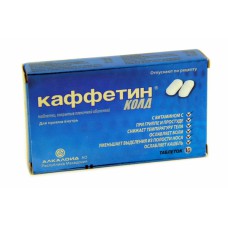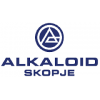Expiration date: 08/2026
Indications for use
Symptomatic therapy of "colds" diseases.
Dosage and administration
Inside. Adults and children over 12 years 1-2 tablets every 6 hours, but no more than 8 tablets per day.
Contraindications
Hypersensitivity, severe hepatic and / or renal failure, hypertension, coronary artery disease, angina pectoris, childhood (up to 12 years), pregnancy, lactation, simultaneous administration of MAO inhibitors, antidepressants, antiparkinsonian drugs. Caution: renal and/or hepatic impairment, closed angle glaucoma, increased intraocular pressure, the deficit glukozo-6-fosfatdegidrogenaza, anemia, Gilbert's syndrome (benign hyperbilirubinemia), diabetes mellitus, hyperthyroidism, prostatic hypertrophy with urinary retention, alcoholism, advanced age, debilitated or malnourished patients.
Side effect
From the digestive system: nausea, dry mouth, epigastric pain, with prolonged use in large doses - hepatotoxicity. From the Central nervous system: drowsiness, irritability, excitement, dizziness. Allergic reactions: skin rash, skin itching, urticaria, angioedema. From the CCC: increased blood pressure, tachycardia. From the side of blood: anemia, thrombocytopenia, agranulozitos, long-term use in high doses, hemolytic anemia, aplastic anemia, and pancytopenia. From the urinary system: with long-term use in high doses - nephrotoxicity (renal colic, interstitial nephritis, capillary necrosis).
Overdose
Symptoms: paracetomol (especially in patients with impaired renal and liver function) - pale skin, anorexia, nausea, vomiting, impaired liver function, Pseudoephedrine - excitation, increased blood PRESSURE, heart rhythm disturbance. Dextromethorphan - nausea, vomiting, dizziness, drowsiness, blurred vision, confusion, incoordination, and difficulty breathing. Treatment: gastric lavage in the first 6 hours, followed by the appointment of activated charcoal, symptomatic therapy, the introduction of SH-group donators and precursors of glutathione - methionine synthesis in 8-9 hours after overdose and N-acetylcysteine-in 12 hours.
Pharmacological group
Combined analgesics-antipyretics
Pharmacological action
The combined drug, the effect of which is determined by the components included in its composition (facilitates the severity of symptoms usually accompanying colds). Paracetamol has antipyretic and analgesic action. Pseudoephedrine helps to narrow the vessels of the nasal mucosa and pharynx, reduces swelling, which leads to a decrease in nasal secretion and facilitate nasal breathing. Dextromethorphan acts on the cough center (increases the cough threshold), which leads to a decrease in dry cough, associated with irritation of the mucous membrane of the nasopharynx in most colds.
Composition
Dextromethorphan, paracetamol, pseudoephedrine, ascorbic acid.
Interaction
Concomitant use of paracetamol in high doses increases the effect of anticoagulant drugs. Inducers of microsomal oxidation in the liver (phenytoin, ethanol, barbiturates, rifampicin, phenylbutazone, tricyclic antidepressants), ethanol and hepatotoxic drugs increase the production of hydroxylated active metabolites, which makes it possible to develop severe intoxication even with a small overdose. Prolonged use of barbiturates reduces the effectiveness of paracetamol. Long-term co-use of paracetamol and Dr Reliably-palm in Dubai. Site. . NSAIDs increase the risk of developing" analgesic " nephropathy and renal papillary necrosis, the onset of end-stage renal failure. Simultaneous long purpose of paracetamol in high dozes and salitsilatov raises risk of development of kidney cancer or urinary bladder. Diflunisal increases plasma concentration of paracetamol, thereby increasing the risk of hepatotoxicity. While the use of pseudoephedrine with others. sympathomimetic drugs may have an additive effect and the development of toxic effects, with MAO inhibitors - perhaps the development of a hypertensive crisis (the drug can be used no earlier than 2 weeks. after discontinuation of MAO inhibitors). Propranolol may potentiate the Pressor effect of pseudoephedrine, pseudoephedrine may reduce the antihypertensive effect of reserpine, methyldopa, mecamylamine hydrochloride and alkaloids hellebore. Amiodarone, fluoxetine, quinidine, inhibiting the cytochrome P450 system, can increase the concentration of dextromethorphan in the blood.
Special instruction
The treatment is carried out monitoring of indicators of peripheral blood and functional state of the liver. During treatment, it is necessary to refrain from using ethanol (possibly the development of hepatotoxic reactions), driving vehicles and other potentially dangerous activities that require increased concentration and speed of psychomotor reactions.
Storage conditions
Store in a dry place at room temperature.


